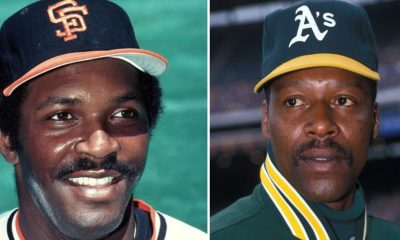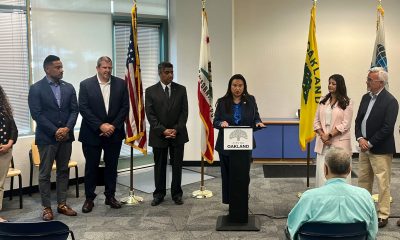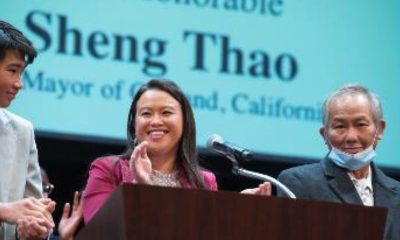Commentary
Posing as a Sports Project – Commentary

One of America’s richest men and an avid Trump supporter, billionaire John Fisher, wants to build 3,000 luxury housing units on the most valuable piece of public land in Oakland, the A’s stadium project, but his proposal has a lot more to do with real estate profits than it does with baseball.
Fisher wants to use the land for condominiums, hotel, and retail development along with a stadium for the A’s. There is much opposition among Oaklanders, and it centers on two problems.
First, the Port of Oakland, where the stadium project is located, is the reason that Oakland is in a better position economically than the old industrial cities of the Midwest. The Port generates 70,000 stable local jobs which, unlike factory jobs, cannot be moved to another country. And because of the historic politics of the local longshore union, many of those good-paying jobs are held by Black workers. Oakland cannot afford to limit its industrial engine because a developer can make a bigger profit from putting high-end condos in the same neighborhood. Furthermore, the new jobs promised by stadium advocates will either be temporary (construction) or low-wage (vendors, clerks and so on).
The demands of wealthy residents, who would inhabit the Fisher project condos, will ultimately overpower the needs of Port industry which can be noisy and dirty 24 hours a day. Decades of urban development have taught us that industrial and residential uses do not mix in the same neighborhood and industry inevitably loses out.
Second, Oakland already has a stadium. It’s in East Oakland, and Oakland families lost their homes to eminent domain fifty years ago when it was built. The Coliseum can be used as it is or it can be redeveloped. That’s what Oaklanders want, as indicated by several polls, and it is, after all, our city.
In answer to this opposition, the Oakland Council mandated a “community benefits” process, meaning that representatives from various groups get together and create a list of things residents might want in exchange for letting Fisher take over their land and build his project. Those serving in this capacity are to be much appreciated.
We do need to consider, however, what is the worth of “community benefits” when, in exchange, we may see maritime job loss, the further gentrification of West Oakland, economic harm to East Oakland, huge increases in traffic and pollution, and the creation of 3,000 housing units that nobody in Oakland can afford to live in. What “benefits” could possibly make up for those losses?
Other cities have done community benefits agreements on projects. Many of those were failures; the items negotiated with the community never happened. The One Hill Project in Pittsburgh and the Atlantic Yards-Pacific Park project in Brooklyn are two examples.
The City Council should vote to a) allow the use of the East Oakland Coliseum land to billionaire Fisher on condition that he actually built a stadium there – not sell his development rights to someone else, and b) reject Fisher’s proposal to take over the Port of Oakland land to build a playground for the rich.
The best thing for us, as a multi-racial working-class city, is 1) To keep the Port humming without Fisher’s interference, while making environmental and equity improvements in Port operations; 2) Refurbish the Coliseum in East Oakland; and 3) Ask some of our Democratic politicians to end their flirtation with major Trump supporter, John Fisher.
Kitty Kelly Epstein, PhD is a professor of education and urban studies, an Oakland resident, the host of Education Today on KPFA; and the author of four books, including her latest “Changing Academia Forever” (2020)
Activism
Oakland Post: Week of April 17 – 23, 2024
The printed Weekly Edition of the Oakland Post: Week of April 17 – 23, 2024

To enlarge your view of this issue, use the slider, magnifying glass icon or full page icon in the lower right corner of the browser window. ![]()
Commentary
Opinion: Surviving the Earthquake, an Eclipse and “Emil Amok.”
Last Friday, a 4.8 magnitude earthquake shook New York City, reported as the “biggest earthquake with an epicenter in the NYC area since 1884” when a 5.2 quake hit. A bit bigger. The last quake similar to Friday’s was a 4.9 in 1783.Alexander Hamilton felt it — 241 years ago. That’s why New Yorkers were freaking out on Friday. They were in the room where it happens.

By Emil Guillermo
I’m a Northern Californian in New York City for the next few weeks, doing my one-man show, “Emil Amok, Lost NPR Host, Wiley Filipino, Vegan Transdad.”
I must like performing in the wake of Mother Nature.
Last Friday, a 4.8 magnitude earthquake shook New York City, reported as the “biggest earthquake with an epicenter in the NYC area since 1884” when a 5.2 quake hit. A bit bigger. The last quake similar to Friday’s was a 4.9 in 1783.
Alexander Hamilton felt it — 241 years ago.
That’s why New Yorkers were freaking out on Friday. They were in the room where it happens.
And it just doesn’t happen that often.
Beyonce singing country music happens more frequently.
When I felt New York shake last week, it reminded me of a time in a San Francisco TV newsroom when editors fretted about a lack of news an hour before showtime.
Then the office carpeting moved for a good ten seconds, and the news gods gave us our lead story.
On Friday when it happened in NYC, I noticed the lines in the carpeting in my room wiggling. But I thought it was from a raucous hotel worker vacuuming nearby.
I didn’t even think earthquake. In New York?
I just went about my business as if nothing had happened. After living near fault lines all my life, I was taking things for granted.
Considering the age of structures in New York, I should have been even more concerned about falling objects inside (shelves, stuff on walls) and outside buildings (signs, scaffolding), fire hazards from possible gas leaks, and then I should have looked for others on my floor and in the hotel lobby to confirm or aid or tell stories.
Of course, as a Californian who has lived through and covered quakes in the 4 to 6 magnitude range, I tried to calm down any traumatized New Yorker I encountered by taking full responsibility for bringing in the quake from the Bay Area.
I reassured them things would be all right, and then let them know that 4.8s are nothing.
And then I invited them to my consoling post-Earthquake performance of “Emil Amok, Lost NPR Host…”
It was the night of the eclipse.
ECLIPSING THE ECLIPSE
In New York City, the eclipse was about 90 percent visible. Good enough for me. Though a full solar eclipse is a celestial rarity, blockages of any sort aren’t generally celebrated. My one-man play is about growing up with the eclipsed history of American Filipinos and how I struggle to unblock all that.
For example, did you know the first Filipinos actually arrived to what is now California in 1587? That’s 33 years before the Pilgrims arrived in America on the other coast, but few know the Filipino history which has been totally eclipsed.
I was in Battery Park sitting on a bench and there was a sense of community as people all came to look up. A young woman sitting next to me had a filter for a cell phone camera. We began talking and she let me use it. That filter enabled me to take a picture of the main event with my iPhone.
For helping me see, I invited her and her boyfriend to come see my show.
Coincidentally, she was from Plymouth, Massachusetts, near the rock that says the year the Pilgrims landed in 1620.
In my show she learned the truth. The Pilgrims were second.
History unblocked. But it took a solar eclipse.
Next one in 2044? We have a lot more unblocking to do.
If you’re in New York come see my show, Sat. April 13th, 5:20 pm Eastern; Fri. April 19, 8:10 pm Eastern; and Sun. April 21st 5:20 pm Eastern.
You can also livestream the show. Get tickets at www.amok.com/tickets
About the Author
Emil Guillermo is a journalist and commentator. He does a mini-talk show on YouTube.com/@emilamok1. He wishes all his readers a Happy Easter!
Commentary
Commentary: Republican Votes Are Threatening American Democracy
In many ways, it was great that the Iowa Caucuses were on the same day as Martin Luther King Jr. Day. We needed to know the blunt truth. The takeaway message after the Iowa Caucuses where Donald Trump finished more than 30 points in front of Florida Gov. De Santis and former South Carolina Governor Nikki Haley boils down to this: Our democracy is threatened, for real.

By Emil Guillermo
In many ways, it was great that the Iowa Caucuses were on the same day as Martin Luther King Jr. Day.
We needed to know the blunt truth.
The takeaway message after the Iowa Caucuses where Donald Trump finished more than 30 points in front of Florida Gov. De Santis and former South Carolina Governor Nikki Haley boils down to this: Our democracy is threatened, for real.
And to save it will require all hands on deck.
It was strange for Iowans to caucus on MLK day. It had a self-cancelling effect. The day that honored America’s civil rights and anti-discrimination hero was negated by evening.
That’s when one of the least diverse states in the nation let the world know that white Americans absolutely love Donald Trump. No ifs, ands or buts.
No man is above the law? To the majority of his supporters, it seems Trump is.
It’s an anti-democracy loyalty that has spread like a political virus.
No matter what he does, Trump’s their guy. Trump received 51% of caucus-goers votes to beat Florida Gov. Ron DeSantis, who garnered 21.2%, and former South Carolina Gov. Nikki Haley, who got 19.1%.
The Asian flash in the pan Vivek Ramaswamy finished way behind and dropped out. Perhaps to get in the VP line. Don’t count on it.
According to CNN’s entrance polls, when caucus-goers were asked if they were a part of the “MAGA movement,” nearly half — 46% — said yes. More revealing: “Do you think Biden legitimately won in 2020?”
Only 29% said “yes.”
That means an overwhelming 66% said “no,” thus showing the deep roots in Iowa of the “Big Lie,” the belief in a falsehood that Trump was a victim of election theft.
Even more revealing and posing a direct threat to our democracy was the question of whether Trump was fit for the presidency, even if convicted of a crime.
Sixty-five percent said “yes.”
Who says that about anyone of color indicted on 91 criminal felony counts?
Would a BIPOC executive found liable for business fraud in civil court be given a pass?
How about a BIPOC person found liable for sexual assault?
Iowans have debased the phrase, “no man is above the law.” It’s a mindset that would vote in an American dictatorship.
Compare Iowa with voters in Asia last weekend. Taiwan rejected threats from authoritarian Beijing and elected pro-democracy Taiwanese vice president Lai Ching-te as its new president.
Meanwhile, in our country, which supposedly knows a thing or two about democracy, the Iowa caucuses show how Americans feel about authoritarianism.
Some Americans actually like it even more than the Constitution allows.
About the Author
Emil Guillermo is a journalist and commentator. He does a mini-talk show on YouTube.com/@emilamok1.
-

 Activism4 weeks ago
Activism4 weeks agoOakland Post: Week of March 27 – April 2, 2024
-

 #NNPA BlackPress4 weeks ago
#NNPA BlackPress4 weeks agoCOMMENTARY: D.C. Crime Bill Fails to Address Root Causes of Violence and Incarceration
-

 #NNPA BlackPress4 weeks ago
#NNPA BlackPress4 weeks agoFrom Raids to Revelations: The Dark Turn in Sean ‘Diddy’ Combs’ Saga
-

 #NNPA BlackPress4 weeks ago
#NNPA BlackPress4 weeks agoMayor, City Council President React to May 31 Closing of Birmingham-Southern College
-

 #NNPA BlackPress4 weeks ago
#NNPA BlackPress4 weeks agoBaltimore Key Bridge Catastrophe: A City’s Heartbreak and a Nation’s Alarm
-

 #NNPA BlackPress4 weeks ago
#NNPA BlackPress4 weeks agoBaltimore’s Key Bridge Struck by Ship, Collapses into Water
-

 #NNPA BlackPress4 weeks ago
#NNPA BlackPress4 weeks agoBeloved Actor and Activist Louis Cameron Gossett Jr. Dies at 87
-

 Community1 week ago
Community1 week agoFinancial Assistance Bill for Descendants of Enslaved Persons to Help Them Purchase, Own, or Maintain a Home






















































